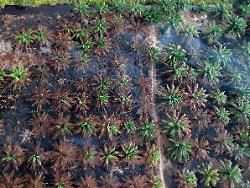Wednesday 17th November 2021
Push for new environmental standards
EU wants new rules for palm oil and waste
For products such as soy or palm oil, a forest area larger than the EU will be destroyed in 30 years. The Commission is now taking action against this. With legislative initiatives, she wants to protect forests – and no longer pass waste exports on to poor countries.
The EU Commission no longer wants to allow soy and palm oil from plantations on newly cleared rainforest areas into the European Union. Overall, imports of goods for the production of which forests have been destroyed could soon be banned in the EU. The responsible EU commissioners Virginijus Sinkevicius and Frans Timmermans present a corresponding legislative proposal. At the same time, the EU Commission proposed stricter rules for waste exports and a strategy for soil protection. “The deforestation and waste transport regulations that we are proposing are the most ambitious legislative efforts in the world to address these issues,” said Sinkevicius.
According to the Commission, around 420 million hectares of forest were destroyed between 1990 and 2020 – an area larger than the EU. This should now be put to an end. In the future, traders and producers should check under the supervision of EU countries whether goods come from areas that have been cleared since the beginning of 2021. This initially applies to imports of beef, wood, soy, palm oil, coffee and cocoa as well as a list of goods that are produced from them – for example chocolate or leather. The list could be expanded later, so Sinkevicius. The rule includes both illegal and legal deforestation and is intended to apply to EU countries and third countries. According to the commission, Brazil and Indonesia, among others, are likely to be affected.
The proposal comes just days after numerous governments promised at the COP26 climate conference to stop deforestation by 2030. With the Waste Directive, EU countries should export less waste to third countries and recycle more themselves. Last year around 33 million tons of waste were exported from the EU, around half of it to countries with lower recycling standards, said Sinkevicius. With the new rule, garbage can only be exported to countries outside the Organization for Economic Cooperation and Development (OECD) if the destination country explicitly agrees and can prove that the garbage is being processed in an environmentally friendly manner.
Waste transport is to be digitized
The majority of the 38 OECD members are considered to be rich industrialized countries. There, too, the Commission wants more controls. Waste transport within the EU is to be simplified and digitized. The Brussels authority also wants to take tougher action against illegal waste deliveries, for example through a specially set up surveillance unit and stricter penalties. The Commission also presented a new strategy to protect the soil. It criticizes the fact that there are no EU-wide measures against soil pollution. However, a specific draft law will not be presented until 2023.
The Green MEP Anna Cavazzini called the proposal to protect the forests “overdue”. According to an April study by WWF, the EU is the second largest driver of deforestation through trade after China. “Products that contribute to forest destruction do not belong on the European internal market,” said MEP Sven Giegold (Greens). “Europe has an impact on forests worldwide and has to take responsibility for it,” said Christoph Heinrich from WWF. The law is a milestone for this. Activists from WWF and Global Witness called for other products for which forests are being cleared, such as corn and rubber, to be included in the list of goods.
The Association of Municipal Enterprises (VKU) welcomed the proposal for waste transport. “It is right and necessary to restrict the export of plastic waste in particular,” said VKU Vice President Patrick Hasenkamp. In Germany and the EU, waste can be recovered well through better recycling processes. The Association of German Metal Traders, on the other hand, criticized the fact that the law does not differentiate between types of waste. This could make the export of recycled metal more difficult, said the deputy chairman Kilian Schwaiger. The legislative proposals will now be presented to the European Parliament and the EU member states. You can still make changes before they are adopted – but this could take several years.
